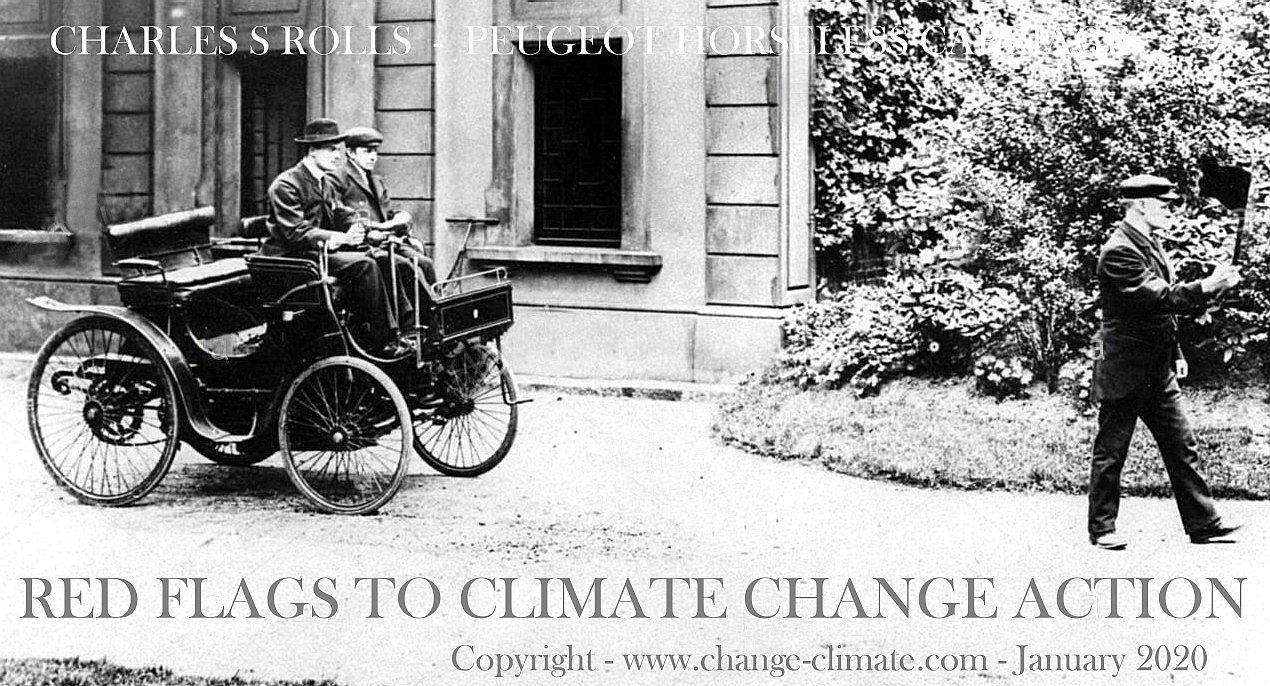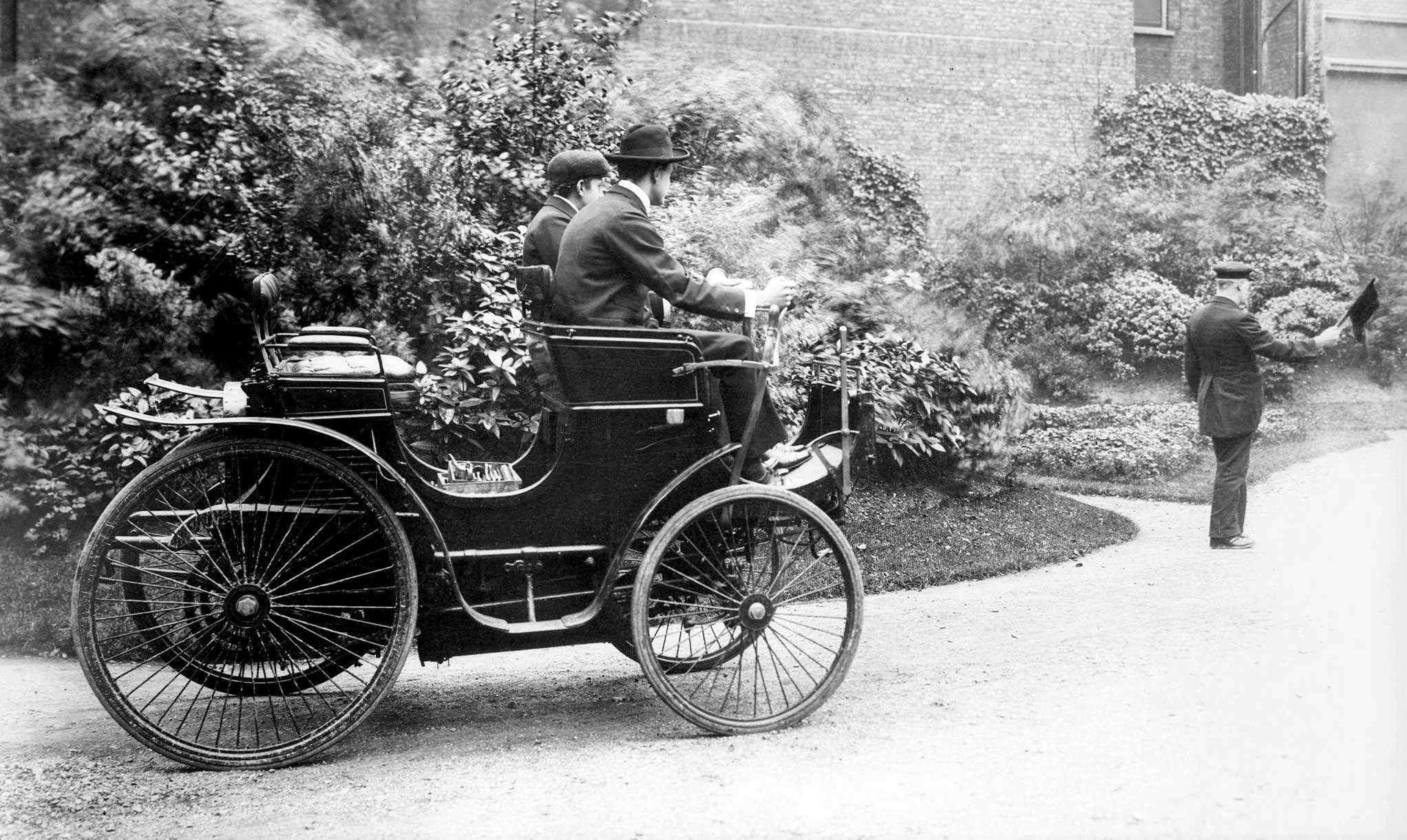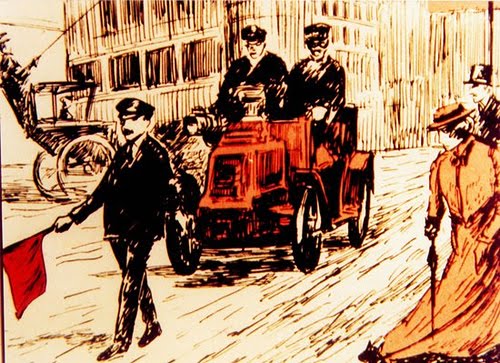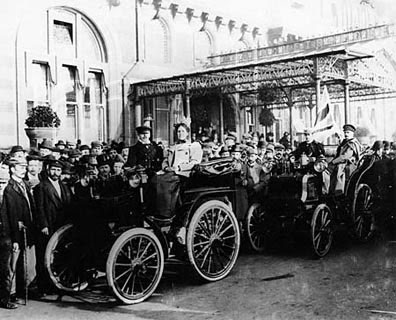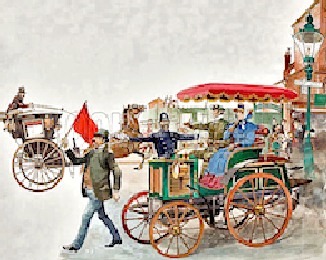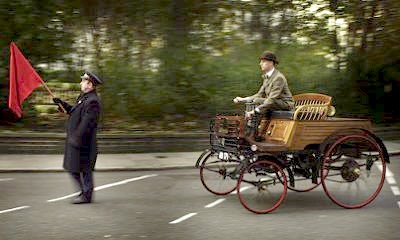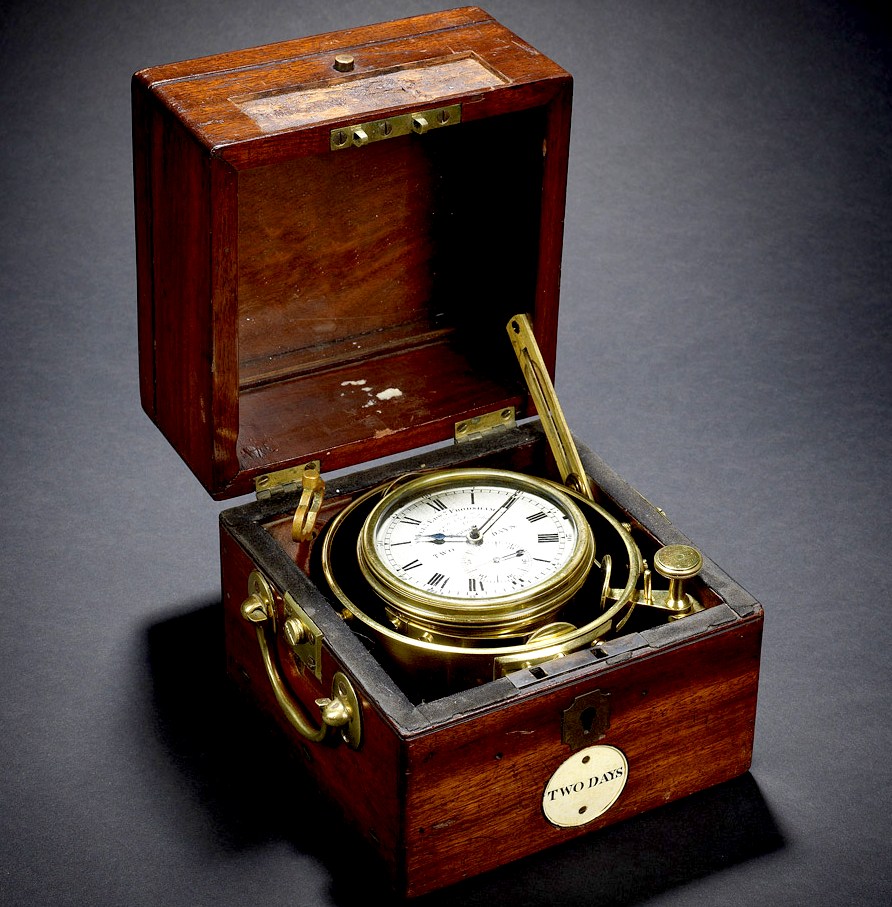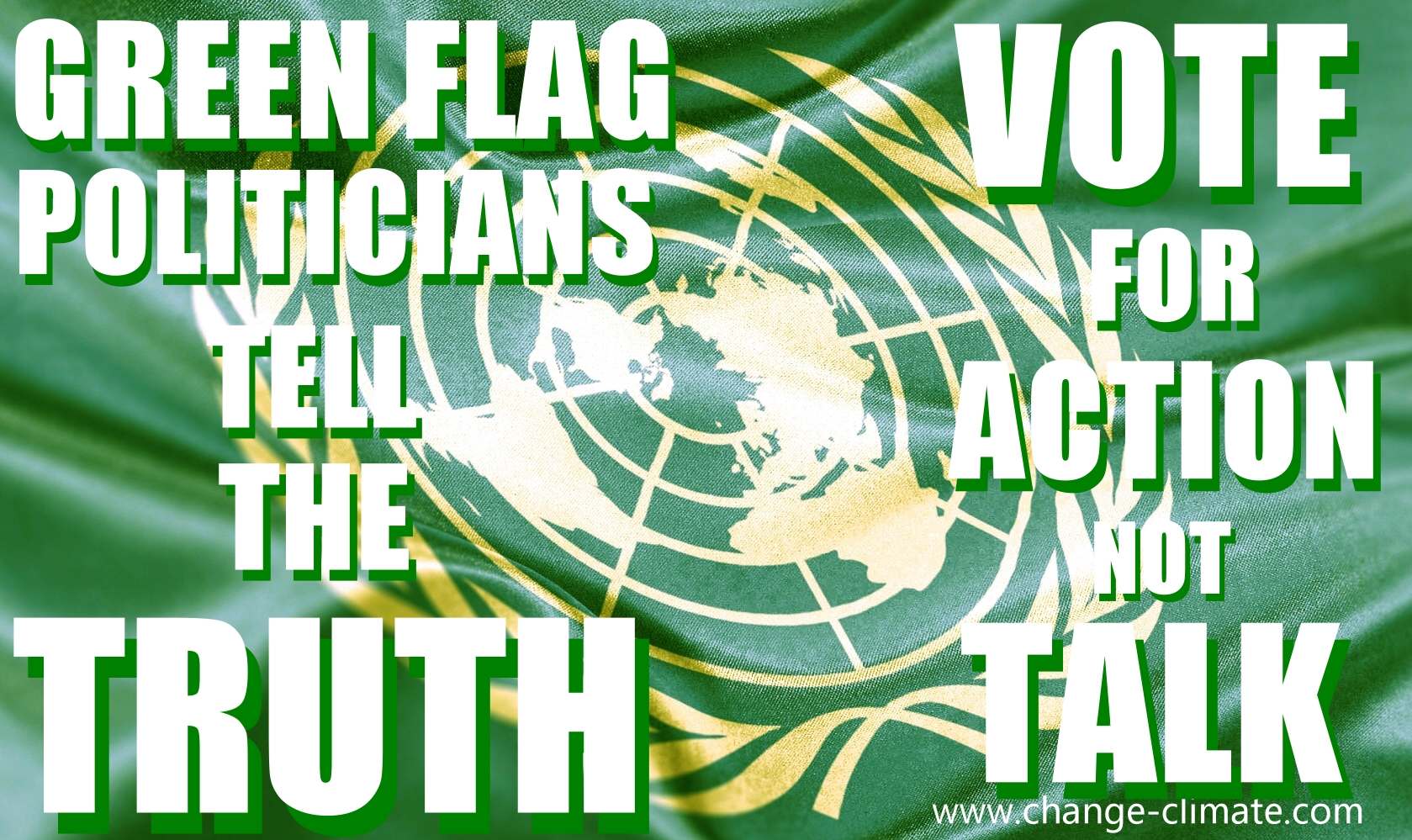|
RED FLAG - LOCOMOTIVE ACT 1865
PLEASE USE OUR A-Z TO NAVIGATE THIS SITE
POLITICAL BLOCKERS - In Britain in 1865, the legislative response to the increasing introduction of self-propelled vehicles on our roads was the Locomotive Act (sometimes known as the Red Flag Act). Amongst a number of provisions, it stipulated that self-propelled vehicles needed to be proceeded with a man walking 60 yards ahead carrying a red flag to warn other road users of the vehicles approach. The objective of powerful stakeholders was to hinder progress to protect their investments in horses, carriages and trains.
155 YEARS
AGO
(1) immediately stop the vehicle, (2) immediately and as rapidly as possible disassemble the automobile, and (3) conceal the various components out of sight behind nearby bushes until equestrian or livestock is sufficiently pacified."
PUBLIC INTEREST?
(1) immediately stop the vehicle,
(2) "immediately and as rapidly as possible ... disassemble the automobile", and
(3) "conceal the various components out of sight, behind nearby bushes" until equestrian or livestock is sufficiently pacified.
The law never took effect, due to a veto by the state’s governor, Daniel H. Hastings.
THE
REVEREND
TOM FAIREY
THE
LOCOMOTIVE ACT 1865, also known as the RED FLAG ACT, required:
38 YEARS OF DENIAL
From 1865, through 1896 through to 1903 and beyond, politicians in the UK used their positions of trust to hinder progress. That is 38 years and more of blocking technology, by the very people who should have been looking to advance technology.
The modern cars we rely on today are the product of the Collective Human Brain. We stand on the shoulders of giants and take our conveniences for granted.
If it took 38 years for our (then) leaders to recognise the advantages of the motor car, what chance have we got to halt Global Warming?
Yup, not much!
In the words of Winston Churchill. "Hope for the best, but prepare for the worst." Get ready then for World War Three. WWIII will be about food and water.
Warming of the planet reduces agricultural land to grow crops and raise livestock and fish harvests.
As the population grows, we will be unable to feed the billions of humans on the planet.
The military in every G20 country know this. They know we are headed to war, and that is why they keep spending buckets of tax dollars on submarines, nuclear missiles, fighter planes, drones and aircraft carriers.
You don't have to be mind reader to see the signs. These are the real life Hunger Games.
TECHNOLOGY CURVE
You may realize from this brief history that politicians and policies follow technology. Politicians and policy makers do not create the technology. The rule makers simply make it harder for the advancement of the human race, as they build their part to justify their existence.
Progress depends on inventors and engineers, biologists and researchers. One way to limit the braking effect of all the Red Tape generated by the rule makers, is to force them to Tell The Truth. We need Green Flag politicians who stand for the honesty and decency that is missing from politics today.
INSTITUTIONALIZATION
- Study of the
British Board
of Longitude reveals more than just the story of an
institution. It shows how economic interests influenced the
political and scientific activities of a state.
The reasons for this were changes within the "scientific landscape" of the United Kingdom and the concomitant struggle for supremacy in influencing the distribution of state support for the science of astronomy and other related scientific projects, the proof of which is that all the surviving papers come from the archives of the Royal Astronomers and their successors, as if John Harrison's solution was perceived as a threat to their dominance of science. John Harrison was thought of as a maverick, who was grudgingly provided financial support, instead of being generously funded to accelerate development.
We should always then look at the appointment of committees and the interests of their members, that should perhaps be recorded in a book declaring such interests such as to avoid potential conflicts. But there is no point in having such a book if there is no effective policing of the corruption that is inevitable where many can be made from technology for those in positions of trust.
Poor old John Harrison was caught up in this mire of subterfuge. But do not think for one minute, that it is any different today.
305 YEARS AGO - THE BOARD OF LONGITUDE 1714
This is a wonderful story about an ordinary clockmaker from the country who took on the scientific experts in the City of London, the military and the political community and beat them to a standstill.
The bad news for our hero John Harrison, is that it took him all of his life to do so. The good news for millions of sailors is that navigation was improved saving lives, and that John's name will forever be associated with state sanctioned discrimination and political obstruction that became institutionalised.
We would thus urge the United Nations, European Union and G20 members to put in place the necessary policing to prevent contributing members of society from being sidelined. It is a sad fact that many of the great creators of this world are not conformists. People who don't conform are not understood and so become targets of derision, rather than receive the support that would make them more productive.
THE GOALS
There is little point having such objectives if member nations only pay lip service to the aims.
OUR (SUGGESTED) SIX STEPS TOWARD A COOLER PLANET
1. TRANSPORT: Phase out polluting vehicles. Governments aim to end the sale of new petrol, and diesel vehicles by 2040 but have no infrastructure plan to support such ambition. Such infrastructure should exceed the performance of fossil fuel filling stations, prolong EV battery life and provide power grids with a measure of load leveling. Any such system should seek to obviate the provision of millions of fast charge points where implementation could prove to be a logistical nightmare. This may involve international agreement as to energy storage format and statute to steer car makers to collaborate in part in a world of competition.
Marine transport can be carbon neutral given the right policies, with phased transition in specific stages such as not to unduly penalize present investment in LNG shipping and other recent MARPOL compliant IC powered vessels. Future cargo vessel should be at least in part powered by renewable energy, on the road to zero carbon, making allowances for technology catchup.
Air travel powered by kerosene should attract hefty mitigation offset, where low carbon alternatives should be encouraged.
2. RENEWABLES: Renewable energy should replace carbon-based fuels (coal, oil and gas) in our electricity for homes, factories, heating and transport. Coal and nuclear power plants should be phased out.
3. HOUSING: On site micro or macro generation is the best option, starting with new build homes that are both affordable and sustainable by design to replace crumbling housing stocks. Encourage building in timber to provide carbon lock from a renewable natural resource.
4. AGRICULTURE: We need to grow more trees to absorb carbon emissions from a growing population, air travel, and to build new homes. We should promote reductions in food waste and eating of foods that use less energy to produce. Educate children on these matters in schools and via campaigns such as no meat Mondays, should be part of ordinary study.
5. INDUSTRY: Factories should be aiming for solar heating and onsite renewable energy generation. EV parking and even service facilities should be part of new industrial estates as part of any building permissions.
6. POLITICS: - National governing bodies need to adopt rules to eliminate administrative wastages, to include scaling down spending on war machines, increasing spend on educating the public and supporting sustainable social policies that mesh with other cultures. This includes fostering policies and making funds available to close links in the technology chain to make up for lost time. Kleptocratic empire building must cease in the search for natural equilibrium.
SUSTAINABILITY BEGINS AT HOME
What happens on your doorstep is what is happening all over the world. Everyone is empire building, over fishing and dumping waste in our oceans in the belief that a little bit more indulgence won't matter. Yes it will!!
PATENTS & DISCRIMINATION
The present patent system discriminates against the ordinary inventor. It works against promoting new technology, where only rich companies and already wealthy persons can afford to take a gamble on developing technology, that the ordinary man in the street simply cannot entertain with an empty bank balance.
Yet, mankind depends on advances to become sustainable and create a circular economy.
Big companies like it the way it is because it means they control the rate of development. That is one reason we have plastics in the oceans and global warming that is changing our climate.
We would urge the United Nations to level the playing field. Patents should be as open an arena as copyright, or design protection. Fees should be at a level where an ordinary working person on an ordinary wage, can apply and compete to be able to develop their contribution to survival of the human race, including protection mother earth and all life on it.
The Sustainable Development Goals are the blueprint to achieve a better and more sustainable future for all. They address the global challenges we face, including those related to poverty, inequality, climate, environmental degradation, prosperity, and peace and justice. The Goals interconnect and in order to leave no one behind, it is important that we achieve each Goal and target by 2030. Click on any specific Goal below to learn more about each issue.
UK RULES FOR FLAG FLYING
- They should not impair the overall visual appearance of the site. Flags should be removed with due care when required to do so by local planning authorities. - Have permission from the owner of any site on which they are displayed. That includes the Highway Authority if it is flown on highway land. - Not obscure (or hinder) the interpretation of official road, rail, waterway, or aircraft signs. - Flags must not create any hazardous situation in relation to the use of these types of transport.
2. Flags which do not need consent provided they comply with further restrictions (deemed consent).
3. Flags which require consent (termed express consent).
FLAGS THAT DO NOT NEED PLANNING CONSENT
- The flag of Saint David or Saint Patrick.
- Any flag of Her Majesty's forces.
- The Armed Forces Day flag.
- The flag of the Commonwealth, the European Union, the United Nations, or any other international organisation of which the United Kingdom is a member.
- A flag of any island, county, district, borough, burgh, parish, city, town or village within the United Kingdom.
- The flag of the Black Country, East Anglia, Wessex, any Part of Lincolnshire, any Riding of Yorkshire, or any historic county within the United Kingdom.
Note: Flying the British flag (the Union Jack Flag) is not illegal in 2020. The flag institute recognises the flags of St George and St Andrew as the national flags of England and Scotland respectively. But, they list those of St David and St Patrick 'separately' because they do not fall into the usual category of a country's national flag.
The flags (or their flagpoles) must not display any advertisement or subject matter in addition to the actual design of the flag.
New regulations allow the attachment of a black mourning ribbon to either the flag or the flagpole. This applies to those flown at half-mast or those projecting outward at an angle from the side of a building.
In fact, it is legal to fly the flag of St George under UK flag laws. But, the person who flies the English flag must have permission from the owner of the site. It must be flown in a safe condition and not cause any danger (e.g. obscuring official road traffic signs).
As a flag flier you would need the permission of the site owner to display any flags (e.g. public houses). Property owners have the right to disallow flags in their buildings or on any vehicles that they own.
LINKS & REFERENCE
https://www.consumeraffairs.com/news/index/2015/02/#faa-releases-proposed-drone-regulations https://mmitii.mattballantine.com/2014/01/07/the-red-flag-man/ https://www.independent.co.uk/life-style/motoring/features/rhodri-marsdens-interesting-objects-lord-winchelseas-red-flag-10358534.html https://torrentfreak.com/the-red-flag-act-of-1865-110626/
This website is provided on a free basis as a public information service. copyright © Cleaner Oceans Foundation Ltd (COFL) (Company No: 4674774) 2022. Solar Studios, BN271RF, United Kingdom. COFL is a company without share capital.
|
